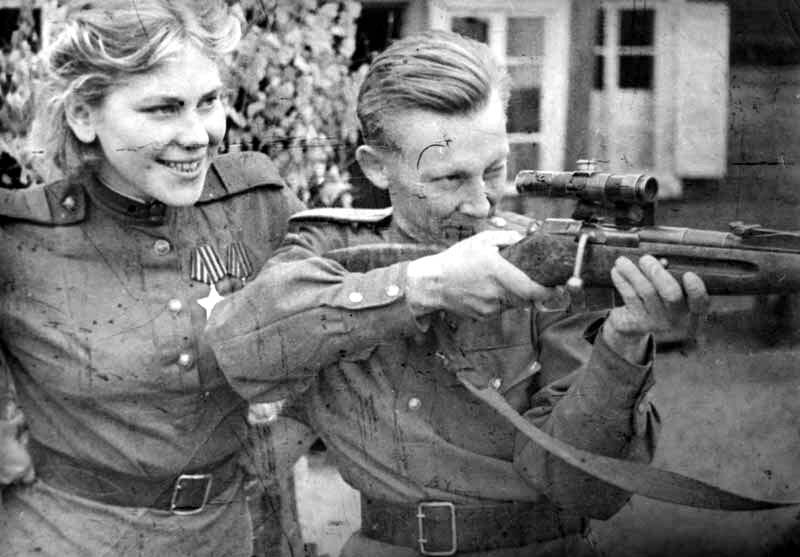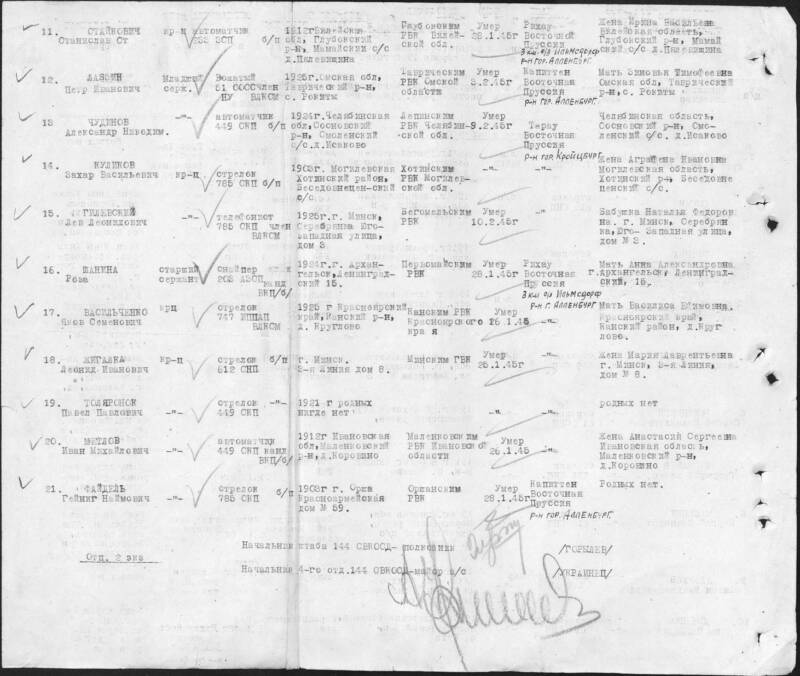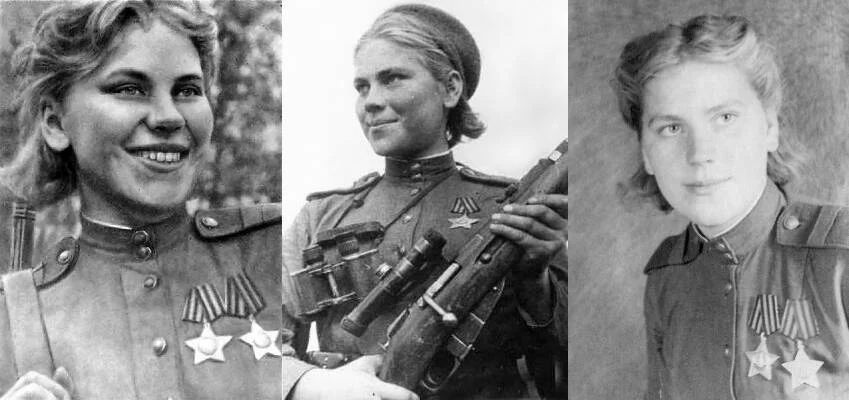In April 1944, a woman fired her sniper rifle. "I've killed a man," she declared, her strength faltering as she collapsed into the trench.
This initial act of combat began what would become a brief yet storied career. By year's end, Roza Shanina was famed for her precise shooting, earning her the nickname "unseen terror of East Prussia."
Roza Shanina's Early Life
Roza Shanina was born on April 3, 1924, in a communal settlement hundreds of miles east of Leningrad (now St. Petersburg), near a river leading to the White Sea. Her parents were Anna, a milkmaid, and Yegor, a logger and World War I veteran.
Upon finishing elementary school, Shanina resolved to pursue further education and walked eight miles each day to and from the nearest middle school in Bereznik.
She was a bright and fiercely independent student, and in 1938, after her parents denied her wish to attend secondary school and study literature, the determined 14-year-old ran away. She walked 50 hours to the nearest train station and traveled north to Arkhangelsk, known as "Archangel" in English.
Once in Arkhangelsk, Shanina stayed with her brother Fyoder until she secured admission to a local secondary school, where she was given a dormitory room and a student stipend. However, when the Nazis invaded the USSR in June 1941, violating the non-aggression pact and triggering an economic downturn, free secondary education was abolished, and Shanina lost her stipend.
To manage her expenses, Shanina started working at a local kindergarten, still aspiring to become a schoolteacher.
 This Female Soviet Sniper Took Down 59 Nazis Despite Being Barred From The Front Lines
This Female Soviet Sniper Took Down 59 Nazis Despite Being Barred From The Front Lines Becoming A Red Army Sniper
As the war encroached upon her city, the Nazis started bombing Arkhangelsk. The courageous teenager volunteered for air raid duty atop the kindergarten where she worked. The death of her brother Mikhail in a December 1941 bombing raid solidified her resolve to join the war effort, both to honor and to avenge him.
Initially, the Soviet military command forbade women from enlisting, but as the situation grew increasingly desperate, they reversed their decision.
Shanina, along with tens of thousands of other Russian women, eagerly applied to join the army.
She joined the Female Sniper Academy and excelled, graduating with honors in April 1944, just as she turned twenty. Her exceptional marksmanship was immediately noted, and the academy urged her to remain as an instructor instead of facing the deadly risks at the front.
However, drawn by the allure of adventure, she chose to become a commander in the 184th Rifle Division's female sniper platoon immediately following her graduation.
Just three days after reaching the western front, Shanina achieved her first kill. She later recounted the experience to the media:
"Finally, in the evening a German showed in the trench. I estimated the distance to the target was not over 400 meters. A suitable distance. When the Fritz, keeping his head down, went toward the woods, I fired, but from the way he fell, I knew I had not killed him. For about an hour the fascist lay in the mud, not daring to move. Then he started crawling. I fired again, and this time did not miss."
Upon realizing what she had done, her legs gave out and she collapsed into the trench. In shock, she exclaimed, "I've killed a man," to which a fellow female soldier responded, "That was a fascist you finished off."
 This Female Soviet Sniper Took Down 59 Nazis Despite Being Barred From The Front Lines
This Female Soviet Sniper Took Down 59 Nazis Despite Being Barred From The Front Lines In May, Roza Shanina received the Order of Glory, becoming the first female sniper honored with this award. She became renowned for her ability to achieve "double hits," successfully striking two targets in quick succession.
Ultimately, she accumulated 59 confirmed kills.
Despite these achievements, Shanina felt frustrated upon her arrival at the front. She frequently found herself relegated to rear positions due to a Soviet policy that aimed to keep women away from the front lines.
On July 29, 1944, she wrote to her friend and war correspondent, Pyotr Molchanov, pleading for his assistance: "If only you knew how desperately I want to join the fighters at the front and kill Nazis... Please speak to someone in authority, though I understand you are very busy."
Unwilling to remain passive, she frequently went AWOL, sneaking to the front lines to add to her tally of "dead little Hitlers."
Roza Shanina: The "Unseen Terror Of East Prussia"
As Roza Shanina's kill count climbed, the media began to take note. Headlines celebrated her prowess: "Follow the example of Roza Shanina!" and "One cartridge, one fascist!" She was described by a Soviet war photographer as "a tall, slender girl with smiling eyes," who insisted that her friends be included in any photographs of her.
On September 23, 1944, the Ottawa Citizen reported from Moscow, profiling the "Red Army Girl" who had "killed five Germans in a single day as she crouched in a sniper's hideout."
By this time, the young sergeant had amassed 46 confirmed kills. Her routine started each foggy morning as she navigated through a muddy communications trench to reach a carefully concealed pit, providing a strategic view of German positions.
 This Female Soviet Sniper Took Down 59 Nazis Despite Being Barred From The Front Lines
This Female Soviet Sniper Took Down 59 Nazis Despite Being Barred From The Front Lines The article recounted a recent incident where Shanina lay in wait, perfectly still, as a German machine-gunner emerged from a sandbag-and-log pill-box. He "crawled sleepily" toward a vulnerable camp, and Shanina, with a steady hand, shot him dead with a single bullet. When two of his comrades rushed to assist him, Shanina took them down as well. Two more Germans appeared and met the same fate.
Shanina had become the "unseen terror of East Prussia," a symbol of the Soviets' deadly and almost supernatural effectiveness in combat.
By October, Shanina's exploits had made her a household name. Soviet journalist Ilya Ehrenburg praised her contributions, exclaiming, "Let the Russian mother rejoice who gave birth to, brought up and gave this glorious, noble daughter to the Motherland!" Women's magazines portrayed her in a skirt, styled as an ancient Russian warrior, rifle in hand.
During her time at the front, Shanina began to keep a diary, recording her experiences in battle as well as her feelings of loneliness, heartbreak, and hopes for what might come after the war.
The war deeply affected her personal life. On October 10, 1944, she wrote, "My heart does not trust anyone." She blamed the harsh realities of army life, which she felt destroyed personal relationships and showed little regard for a woman's feelings. Though she made friends and sometimes formed romantic attachments, she often lost these companions to the war.
Roza Shanina's Final Days
As her days on the frontlines accumulated and the gunfire seemed unceasing, her diary entries grew more despondent.
"Frost in the tank, unaccustomed to tank smoke and it hurts my eyes; I can't breathe these fumes. Slept like the dead," she jotted down on Jan. 16, 1945. She continued: "I'm finally sure that I'm not capable of love."
 This Female Soviet Sniper Took Down 59 Nazis Despite Being Barred From The Front Lines
This Female Soviet Sniper Took Down 59 Nazis Despite Being Barred From The Front Lines The next day may have been even worse. "Today for me seemed like a month," she wrote on January 17. "Nearly vomited at all the body parts. Bandaged the wounded and moved forward… Frost, hunger. Went into a unit. The guys threw some filthy compliments at me. Filthy language everywhere. So tired. I went off on my own."
On January 24, 1945, she recounted a distressing incident where the head of the regiment pursued her aggressively, treating her as if he were in a brothel. Later in the same entry, she described how the colonel's son, in a drunken state, threw her onto a couch and forcibly kissed her. Distraught, she called out to his father:
Her life ended prematurely, at a time when she was contemplating her future, feeling alone, and longing for something beyond the war. On January 27, 1945, two soldiers discovered her on the battlefield, fatally wounded by shrapnel that had torn open her chest, as she slumped over a wounded officer in a protective embrace.
It was too late to save her. She was laid to rest with full military honors in eastern Germany.
As the first female Soviet sniper to receive the Order of Glory and one of the most lethal snipers of World War II, her legacy remains significant, particularly in Russia.Her friend and correspondent, Pyotr Molchanov, safeguarded her letters and diaries for 20 years. In 1965, he permitted their publication, ensuring that Roza Shanina's remarkable story received the recognition it deserved.



















